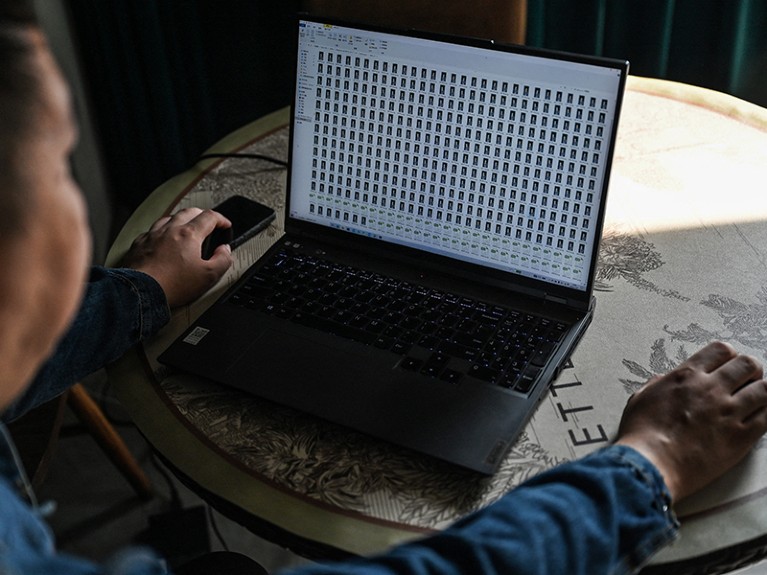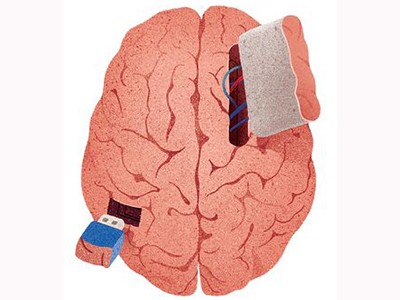
By means of digital actuality, folks can work together with avatars of family members.Credit score: Andrii Zastrozhnov/Getty
The Digital Departed: How We Face Dying, Commemorate Life, and Chase Digital Immortality Timothy Recuber NYU Press (2023)
Many people could have turned to the Web to grieve and bear in mind the useless — by posting messages on the Fb partitions of departed mates, as an illustration. But, we should always give extra thought to how the useless and dying themselves exert company over their on-line presence, argues US sociologist Timothy Recuber in The Digital Departed.
In his expansive scholarly evaluation, Recuber examines greater than 2,000 digital texts, from weblog posts by those that are terminally sick to on-line suicide notes and pre-prepared messages designed to be e-mailed to family members after somebody has died. As he notes, “the digital information on this guide are unhappy, to make sure, and so they have typically introduced me to tears as I collected and analyzed them”. But, they’re nicely price delving into.
Recuber brings a contemporary lens to research of demise tradition by specializing in the emotions and intentions of the people who find themselves dying, moderately than these of the mourners. For instance, he finds that an individual’s sense of self will be altered by running a blog about their sickness. Writing freely helps folks to return to phrases with their deaths by making their struggling “legible and comprehensible”. Reflections on household and mates additionally reveal a way of self-transformation. Certainly, many bloggers “attested to the optimistic worth of the expertise of a terminal sickness, for the way in which it introduced them nearer to family members and particularly for the knowledge it generated.”
This theme of self-transformation, which Recuber refers to as ‘digital reenchantment’, continues all through the guide. This terminology pertains to the work of German sociologist Max Weber, who, on the flip of the 20th century, argued that people’ growing skill to know the world by science was robbing lifetime of magic and thriller — a course of he known as disenchantment. When the useless appear to be resurrected by digital media, Recuber argues, they regain that thriller.
The mechanics of thoughts
Recuber explores how X (previously Twitter) hashtags can act as a type of collective on-line rememberance. He focuses on photographs and tales shared in posts that use two hashtags, sparked by violent deaths of Black folks in the USA: #IfIDieInPoliceCustody, in response to Sandra Bland’s demise in jail in Waller County, Texas, in July 2015, and #IfTheyGunnedMeDown, which remembers Michael Brown, who was shot by police in Ferguson, Missouri, in August 2014. The “hundreds of particular person micro-narratives” posted in these threads, Recuber writes, quantity to a “collectively composed story affirming the worth of all Black lives and legacies”. They’re memorials for the lives which have already been misplaced and for people who is likely to be in future.
The creator considers the views of the people whose deaths impressed every hashtag. For instance, 28-year-old Bland was imprisoned after being arrested for a driving offence. Family and friends questioned the police’s assertion that Bland had dedicated suicide, and #IfIDieInPoliceCustody was tweeted 16,500 instances in its first week, as the results of the web consideration that the case gained. What would Bland and Brown consider this protection, Recuber asks? They could have been pleased with this legacy, however that they had no say in it. In a way they’re “doubly victimized”, he suggests, shedding not solely their lives but additionally “the company to outline themselves and the methods they’d wish to be remembered”.
Within the guide’s most intriguing part, Recuber turns to transhumanism — the concept, a while sooner or later, superior applied sciences but to be imagined might allow digital data of the human thoughts to be uploaded to the Web. An individual’s consciousness might then ‘reside’ on-line endlessly.
Recuber interviews 4 males who lead corporations which might be serving to folks to protect digital facets of themselves or which might be in any other case involved with transhumanism. Bruce Duncan runs the Lifenaut challenge, a part of the non-profit Terasem Motion Basis, based mostly in Bristol, Vermont, which permits customers to create a digital archive of their reflections, photographs and genetic code for future researchers to check. Eric Klien is the president and founding father of the Lifeboat Basis, a non-governmental group based mostly in Reno, Nevada, which is dedicated to overcoming catastrophic and existential dangers to people, together with from misuse of applied sciences. Robert McIntyre is the chief govt of Nectome, based mostly in San Francisco, California, which works on strategies for embalming brains for future data retrieval. And Randal Koene is the chief scientific officer of the Carboncopies Basis, based mostly in San Francisco, a analysis group that works on whole-brain emulation — a “neuroprosthetic system that is ready to serve the identical operate because the mind”.

Synthetic-intelligence companies are working to develop digital replicas of the useless.Credit score: Hector Retamal/AFP/Getty
In accordance with Recuber, none might give a transparent rationalization for a way thoughts importing would work. That’s not shocking — neuroscientists are divided on whether or not it’s even doable. However every interviewee had religion that it might turn out to be a risk. Koene wonders whether or not uploaded minds may discover a dwelling in some form of robotic physique. Duncan and McIntyre think about a disembodied human consciousness in a position to journey by house and go to different planets or stars.
But, Recuber was troubled to search out that these males stated little or no in regards to the social and moral questions raised by thoughts importing. Constructing a ‘superior’ sort of human has a “whiff of eugenics” about it, he writes. The entire course of could be costly, maybe making a future division in social courses, with solely the wealthy in a position to afford it. Duncan and Koene identified that this may not be true sooner or later — the costs of applied sciences, akin to smartphones and data-storage items, are likely to fall fairly shortly.
Recuber does discover folks elevating moral issues on the web dialogue platform Reddit, the place he examined greater than 900 posts about transhumanism. One person was appalled that “the richest and most comfy folks in historical past spent their cash and sources making an attempt to reside endlessly on the backs of their descendants”. However philosophical debates are far more fashionable, akin to whether or not the uploaded disembodied thoughts could be equal to or superior to at least one’s personal.
Transhumanism, Recuber notes, is working in the direction of a really totally different sort of on-line legacy from these mentioned elsewhere in his guide; it’s centered not on strengthening ties with humanity however on slicing them. This concept of transferring past mortal organic limits — gaining immortality by science and know-how — is an outdated dream in a brand new guise. For spiritual folks, the immortal substance is the soul; for transhumanists, it’s the thoughts.
Saving the digital world
It’s in these critiques of transhumanism that Recuber is at his sociological finest. His astute feedback exemplify a second theme of The Digital Departed — that inequalities that persist within the bodily world are mirrored in peoples’ on-line lives. He cautions the general public about narratives that promote technological progress as essentially good. Regardless of the rhetoric of liberation by technological progress, all of us should stay cautious. There are not any ensures that thoughts importing will probably be correctly regulated, or profit these in want. Mortal issues akin to meals and water shortages and human violence, in addition to the shortage of housing and well being care, have better precedence in my opinion.
It’s a disgrace, nonetheless, that the guide ignores feminist views on transhumanism. These contend that concepts of the soul or thoughts in philosophy have traditionally operated as a gender hierarchy — males and the masculine are thought-about primordial, whereas girls and the female are handled as secondary, linked to the physique and the mortal realm. Transhumanism is not going to profit girls or gender-diverse folks except it engages with its personal inherited techniques of thought and narrative.
Nonetheless, The Digital Departed is a helpful guide that presents many transferring tales about the way in which that our digital life foreshadows our organic departure. The creator’s engagement with classical and fashionable sociological principle will probably be appreciated by students and attraction to readers of all stripes.



